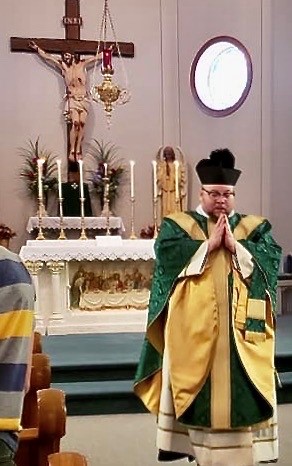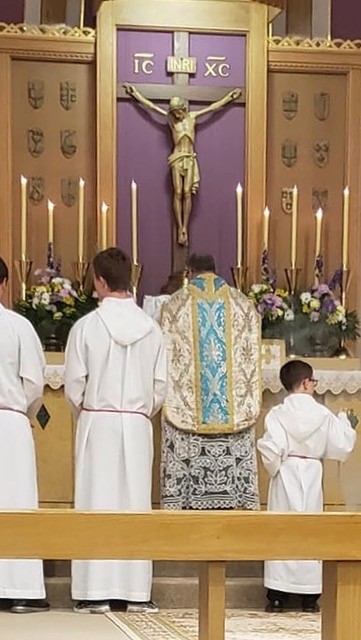Embracing a Painful Cross: Priest Discusses His ALS Diagnosis
Father Dana Christensen is relying on spiritual strength in his health battle.

For Father Dana Christensen, 43, of the Diocese of Sioux Falls, South Dakota, the Christmastime diagnosis of degenerative Amyotrophic Lateral Sclerosis (ALS) was one that left him “immediately panicked and feeling like being emotionally kicked in the gut.”
The Register spoke to Father Christensen about his diagnosis of Lou Gehrig’s disease, of which there is no known cure. He also discussed the response of his parish community and the larger Church community, as well as facing suffering, spiritual darkness and surrender to God’s will, all the while possessing a profound appreciation of his priestly vocation.
Could you provide a quick overview of your vocation story?
I am one of those rare birds who has wanted to be a priest since I can remember, and even before. Family legend tells me that I was playing Mass and giving my great-grandparents “communion” before I can remember. After high school, because of fear, I took a year off and then went to seminary. I did my philosophy at Immaculate Heart of Mary Seminary in Winona, Minnesota, and theology at Kenrick[-Glennon] Seminary in St. Louis, Missouri, during the Archbishop [Raymond] Burke days. These years in St. Louis were blessed days where I got to know my friend and mentor Cardinal Burke, who is a great encouragement to me.
Currently I am pastor of three rural parishes in the Diocese of Sioux Falls, South Dakota, chaplain to a monastery of traditional discalced Carmelite nuns and chaplain to the local fire department.


What drove you toward seeking medical diagnosis?
In July I started noticing fasciculations (muscle twitching) in my left arm and hand. After seeing a number of doctors I landed in neurology, where they did numerous tests. ALS is one of those diseases that doesn’t have a “positive” test. Rather, they have to rule all other possibilities out, so there are many tests to undergo. After these tests, I went on a personal pilgrimage to Fatima that had been planned for quite some time. It was a fruitful pilgrimage — one that in hindsight was more providential than I knew at the time.
It was as I was driving from Minneapolis to my home in Alexandria, South Dakota, that I was informed via phone that the working diagnosis was ALS. As you might imagine, I was immediately panicked and felt like I was emotionally kicked in the gut. I’ve never had a physical reaction to bad news like this, but there I was, trying to keep it together. It’s hard to describe to those who haven’t experienced it. In my priestly ministry, I have often been with people in the midst of tragedy, death and bad diagnoses. I always thought I understood, or was wise in my advice. Now I know I was naïve. When the cross presents itself suddenly, there is no way to be prepared, nor is there a “wise” thing to say.
I find it amazing that the working diagnosis came when it did, on the heels of my time in Fatima. I am convinced that it was no coincidence. Our Lady, like the good mother she is, was preparing me for this, and she showed her hand of protection. A very kind and humble sacristan said to me on my last night in Fatima after the candlelight procession, “You may have come to Fatima alone, but you do not leave alone. Our Lady goes with you.” How true that has been for me. Our Lady of Fatima has accompanied me in this journey. I also told Our Lady in Fatima, “You have my permission to do whatever it takes to make me a saint.” I believe my diagnosis is an answer to that prayer. It’s not the answer I wanted or expected, but it is the way Jesus has chosen for me to become little, humble, pure and holy. I do not doubt that all of this is a mysterious grace of Fatima.
For the next month, I was in a deep darkness. Fear, panic and depression was my daily bread. I found it hard to pray, and the Lord seemed far away. One of the ways I found my way through this was the “Surrender Novena.” A priest friend sent me a copy, and it was a lifesaver. It taught me to trust again and surrender myself to Jesus completely.
Eventually I went to Mayo Clinic for a second opinion, and it was there that the diagnosis was confirmed. That was shortly before Christmas. Since I went public with my diagnosis, the support is overwhelming. My family has been so supportive — I couldn’t ask for a better family in this time. Their strength strengthens me and occasionally moves me to tears. My parishes and the nuns to whom I am chaplain have also been incredibly supportive and eager to help.
Often, the antidote of “offer it up” is prescribed to those who suffer. This, however, sometimes doesn’t go far enough for those who must endure. How did you come to accept the diagnosis, and what are you learning through your endurance?
I am very familiar with that phrase. Parishioners will tell you it is a mantra for me. It’s easy to say, but very hard to do. I frequently make an act of the will to offer my sufferings to Jesus through Mary. It helps me to know that my suffering is not in vain, but is being used by Our Lord for his glory. I trust he is using it for good, even if I can’t see it.
Acceptance of all of this is an ongoing project. Each new day brings a little bit more weakness that I have to accept, so it’s a daily choice to accept it and surrender, or to become bitter and angry. One of the things I am learning is something that I’ve not been good at, namely, humility. This disease makes me weak, little and reliant on others to do simple things. It will eventually take away my voice, my ability to move at all, my ability to eat, even the ability to breathe on my own. I will become physically, at least, an infant. Mentally I will be the same me I’ve always been. Thankfully this disease can’t take that away.
This is teaching me that I am weak, and Jesus is strong. It is teaching me that I am in utter need of him and his mercy. Without him, I can do nothing. With him, I can do anything, even endure this disease with strength and grace.
What challenges are you most anxious over, with regard to your vocation and your diagnosis? How can we help?
I am most anxious about losing my ability to offer Mass. I trust God will sustain me in that particular trial, but it still makes me anxious. I believe that no matter what happens, Our Lord will provide a way to exercise my priestly ministry, even if it is in a different way. I am and will always be a priest. ALS can never take that from me. When ALS takes my ability to offer the Holy Sacrifice, I myself will offer my body as a living sacrifice of praise.
People can help first and foremost by praying through the intercession of Venerable Fulton J. Sheen for a complete cure. There is also a PayPal account started by my family to help defray expenses. You can give here.
There is also #padresfight swag that can be purchased here.
What is the difference between “submission” to the will of God (as is taught in Islam, for example) and “surrender” to his will? Can you expand on this, in light of your diagnosis?
This is true, and there is a clear difference. Submission, in [Islam], reflects a god who is not merciful, but only just — a god of anger and death: a god who is not love and to be loved, but rather a god who is to be feared, because if you do not submit you will be punished without mercy.
Surrender is something that relies on God’s mercy. One surrenders to a God of love, because we know he is love. We surrender to Love out of love. While we do believe God is perfectly just, we also believe he is perfectly merciful and infinitely loving. I could never surrender to Our Lord if I didn’t believe that he loves me and will only permit me to endure evil if he knew he would bring about a greater good.
Has your diagnosis affected how you are approaching the Four Last Things and this Lent, and has God revealed to you your mission?
My mission is the same mission God gave me on the day of my baptism and on the day of my ordination: to become a saint and to make saints. How I do that is changing, but that is my mission.
Of course my thoughts on the Last Things have changed, primarily in that they have become incredibly real. I’ve also been preaching much more than usual about how heaven is everything and is worth any sacrifice we must make to attain it.
We live in a world where idolatry reigns, sadly even in the Church. We have, as a society, put most everything above salvation. We have put power, popularity, money, pleasure, compromise with the spirit of the world, sports, etc., above salvation and holiness. My diagnosis has taught me how worthless these things are compared to the glory of eternal life. Heaven is everything!
Bree A. Dail is the international coordinator for
Rosary Coast to Coast and the Holy League of Nations.
- Keywords:
- als
- bree a. dail
- illness
- suffering
















